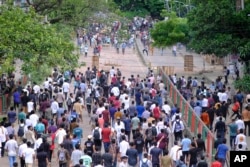Student Union
Bias Against Skin Color Seen Globally
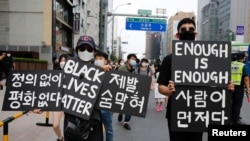
Alfiana A. Rosyadi, an Indonesian who recently completed graduate school in South Korea, said the Black Lives Matter movement in the U.S. has made her think about the well-documented and pervasive racism outside the U.S.
"People may say this is just America's issue, but white privilege exists around the world," Rosyadi said. "This movement has given me insight that this can happen in my country, too."
Black Lives Matter (BLM) protests — condemning racial injustice and excessive use of police force — erupted across the U.S. after George Floyd, a 46-year-old African American, died in Minneapolis last month after being restrained by a white police officer.
The protests have spread across the world, as well.
"People are acknowledging that racism and discrimination happen everywhere," said Rosyadi. "So, I think they are showing solidarity to the Black Lives Matter movement to stop all kinds of racism in the world."
Hate crimes
In the U.S., recent hate crime statistics show that nearly 60 percent of the documented 7,036 incidents in 2018 were motivated by a bias against someone's race, ethnicity or ancestry bias, according to the FBI.
Of the nearly documented 5,000 hate crimes against race, ethnicity or ancestry, 46.9 percent were anti-Black or African American bias; 20.2 percent were anti-white bias; and 13 percent were anti-Hispanic or Latino bias.
Around the world, hate crime data from 42 participating states show that of 5,735 incidents in 2018, 1,825 (31.8 percent) had a racist or xenophobic bias, according to the Organization for Security and Cooperation in Europe.
And the Global Slavery Index in 2018 shows slavery continues in many countries in Africa, the Middle East, Asia, Australia and New Zealand. That includes forced labor, commercial sexual exploitation of children, and forced marriage.
"We see it present across the world in different configurations, towards different groups and on the basis of a variety of ideologies," said Mohammad-Mahmoud Ould Mohamedou, professor of international history and chair of the international history department at the Graduate Institute of International and Development Studies (IHEID) in Geneva, in an interview with IHEID earlier this month.
"The problem is just as gnawing and complex in these other places — see, for instance, how in recent months, in the context of the coronavirus crisis, Chinese nationals (and Asians more generally) were at the receiving end of racist incidents in many places while simultaneously in China some African students and migrants were discriminated against," he said.
Indonesia
In Indonesia, BLM protests have reignited the discussion about racism toward Papuans after news of protests in the U.S. spread among Indonesia's online community.
Papua and West Papua are Indonesia's two easternmost provinces, where the population is mostly dark-skinned Melanesians.
"I haven't personally experienced discrimination based on my skin color, but sometimes people from the east of Indonesia, who have darker skin, may get treated differently because people are not used to seeing them," said Rosyadi.
"My concern is that more people like fairer skin, especially for girls, and so some use a lot of [skin-lightening] products. Many Indonesians lose confidence for having darker or tanner skin because on the TV, actresses or other celebrities have fair skin," she added.
Skin-lightening products
Skin-lightening products are popular in many countries. A basic Google search for "skin-lightening" lists hundreds of products using images of Black, white, Asian and Latina, mostly female, skin.
In 2018, American pop star Blac Chyna was criticized for promoting a skin-lightening product called "Whitenicious" in Nigeria, where 77 percent of women use skin lighteners, according to the World Health Organization.
"Many use it in the hopes that they'll have an easier time ascending in their careers, finding husbands, or simply for a self-esteem boost in a society that looks at lighter-skinned women more positively," wrote online news outlet Vice.
This week, multinational manufacturer Johnson & Johnson said it would no longer sell skin-lightening products.
"I think more recently people are beginning to embrace darker or tanner skin, and seeing them as beautiful," said Rosyadi.
China
Lucy Ma, a freshman from China studying at Emerson College, said racial stereotypes have been perpetuated after high-profile crime cases involved minorities in her home country.
"People in small cities have less chance to really know the minorities in China, which creates a higher rate of racism," Ma said. "Big cities have more minorities than the small cities, and people in the big cities know the stereotypes cannot be the factor of how we define people. That's why there are much fewer racists in big cities."
While she said she's heard of no street protests in China, "people are supporting BLM groups through social media such as Weibo," said Ma. "There is a racism problem in China, but it is generally based on where you are, especially in small cities where there's much less diversity than the big cities."
India
Racism in India, with its tradition of a caste system, includes alleged birth rights, regional origin, religion, poverty or wealth.
"If you watch Bollywood movies you'd imagine India was a country of white folks," author and human-rights activist Arundhati Roy told Dalit Camera in a June 8 interview.
"Indian racism towards Black people is almost worse than white people's racism," she said.
South Korea
Dawoom Jung, a senior majoring in international studies and justice and civil leadership at Yonsei University in South Korea, said she noticed many Korean artists and social media influencers use their platform to bring awareness to BLM.
"I've seen a lot of Korean influencers and artists participate in the #blackouttuesday social media movement and donate to organizations. I've also seen illustrators take the initiative to translate the news into Korean and make cue cards so people in Korea can also follow what is going on," said Jung.
Taking action
While social media has been an effective tool to discuss racism globally, some say more action needs to be taken offline.
"It's easy for people to post a black picture with the #blacklivesmatter hashtag, but it isn't more than granting attention to the subject. It simply doesn't truly help anyone," said Kenny Teucher, a student studying English and biology at Leipzig University in Saxony, Germany.
"In Germany, many people were involved in the subject, but only on Instagram and Facebook. I think that it is a problem that only few people want to take it a step further, whether it is through demonstrations or other political engagement," he added.
In France, society has grappled with the unsolved case of Adama Traoré, a Malian French man who died in 2016 after being restrained by police. Elise Crespin, a recent graduate from the Saint-Luc Tournai Institut, said #JusticepourAdama (Justice for Adama) has been revived since BLM protests.
"His family and especially his sister have been leading protests since his death. He is an example of what is going on in France, because he is not the only one," said Crespin.
"I think we are tired of hearing the same things and the same injustices. Everyone woke up. Our systems are wrong and they must change," she said.
Kathleen Struck contributed to this report.
See all News Updates of the Day
Tips for first-year international students in the US
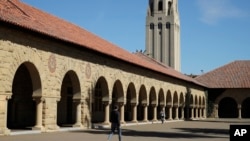
Book your flights right away, get a U.S. phone plan, make sure you have linens for your dorm and attend orientation – that’s some of the advice international students have for first-year college students coming from abroad.
U.S. News & World Report compiled helpful tips for students studying in the United States for the first time. (July 2024)
Survey: Social integration, career prep are important to international students
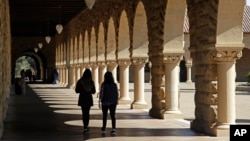
A recent survey of international students in the United States found that before starting school, they were concerned about personal safety, making friends and feeling homesick.
Inside Higher Ed reports that international students want specialized orientations, peer connections, career preparation and job placement to help make their college experiences successful. (July 2024)
US advisory council ends Nigeria visit, signs student exchange deal
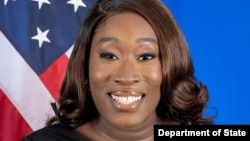
Members of a U.S. presidential advisory council have approved a student exchange deal between an American college and a Nigerian university as part of the council's effort to strengthen collaboration on education, health, entrepreneurship and development between Africa and Africans living abroad.
The council also visited a health facility supported by the United States Agency for International Development in the capital.
Nigerian authorities and visitors chatted with members of the U.S President's Advisory Council on African Diaspora Engagement as they toured a healthcare facility in Karu, a suburb of Abuja, on the last day of the council's three-day visit to Abuja and Lagos.
The facility is one of many supported by the United States Agency for International Development, or USAID, to improve the management of childhood illnesses, family planning, immunization and delivery.
The tour was part of the council's effort to promote African diaspora-led investments in technology entrepreneurship, education and healthcare delivery.
"They're doing a phenomenal job there, it really gave us a sense of what the healthcare system is in Nigeria," said Deniece Laurent-Mantey, executive director of the advisory council. "This is our first trip as a council to the continent and we chose Nigeria for a reason — the diaspora in Nigeria is very active, very influential, and they're really a source of strength when it comes to our U.S.-Africa policy. And so for us coming to Nigeria was very intentional."
The council was created by President Joe Biden in September to improve collaboration between Africa and its diaspora in terms of economic and social development.
Akila Udoji, manager of the Primary Healthcare Centre of Karu, said officials in Nigeria were pleased that the council members were able to visit.
"We're happy that they have seen what the money they have given to us to work with has been used to do, because they have been able to assist us in capacity-building, trainings, equipment supply and the makeover of the facility," Udoji said.
Earlier, the council signed a deal for a student exchange program between Spelman College in the southern U.S. city of Atlanta and Nigeria's University of Lagos.
Laurent-Mantey said education exchanges are one of the council's top priorities.
"In Lagos, we had the president of Spelman College — she's also a member of our council — she signed an agreement with the University of Lagos to further education exchange programs in STEM and creative industries between those two universities," Laurent-Mantey said. "And I think for us it's very important, because Spelman College is a historically Black university, and so here we are promoting the importance of collaboration between African Americans and Africans."
In March, the advisory council adopted its first set of recommendations for the U.S. president, including the student exchange initiative, advocating for more U.S. government support for Africa, climate-focused initiatives, and improving U.S. visa access for Africans.
The council met with Nigerian health and foreign affairs officials during the visit before leaving the country on Wednesday.
American Academy of the Arts College announces closure
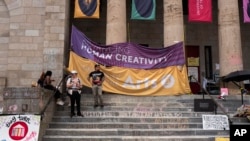
The American Academy of Art College in Chicago announced it would be closing after 101 years of preparing students for careers in art and illustration.
WTTW news reported that like other art colleges, the academy saw enrollment drop after the pandemic, and officials made the decision to close the college last month. (July 2024)
5 killed, dozens injured in clashes over Bangladesh jobs quota system
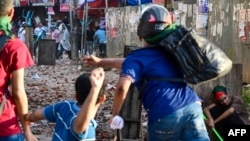
At least 5 people were killed and dozens injured in two separate incidents in Bangladesh as violence continued Tuesday on university campuses in the nation's capital and elsewhere over a government jobs quota system, local media reports said quoting officials.
At least three of the dead were students and one was a pedestrian, the media reports said. Another man who died in Dhaka remained unidentified.
The deaths were reported Tuesday after overnight violence at a public university near Bangladesh's capital, Dhaka. The violence involved members of a pro-government student body and other students, when police fired tear gas and charged the protesters with batons during the clashes, which spread at Jahangir Nagar University in Savar, outside Dhaka, according to students and authorities.
Protesters have been demanding an end to a quota reserved for family members of veterans who fought in Bangladesh's war of independence in 1971, which allows them to take up 30% of governmental jobs.
They argue that quota appointments are discriminatory and should be merit-based. Some said the current system benefits groups supporting Prime Minister Sheikh Hasina. Some Cabinet ministers criticized the protesters, saying they played on students' emotions.
The Bengali-language Prothom Alo daily newspaper reported that one person died in Dhaka and three others, including a pedestrian, were killed after they suffered injuries during violence in Chattogram, a southeastern district, on Tuesday.
Prothom Alo and other media reports also said that a 22-year-old protester died in the northern district of Rangpur.
Details of the casualties could not be confirmed immediately.
While job opportunities have expanded in Bangladesh's private sector, many find government jobs stable and lucrative. Each year, some 3,000 such jobs open up to nearly 400,000 graduates.
Hasina said Tuesday that war veterans — commonly known as "freedom fighters" — should receive the highest respect for their sacrifice in 1971 regardless of their current political ideologies.
"Abandoning the dream of their own life, leaving behind their families, parents and everything, they joined the war with whatever they had," she said during an event at her office in Dhaka.
Protesters gathered in front of the university's official residence of the vice chancellor early Tuesday when violence broke out. Demonstrators accused the Bangladesh Chhatra League, a student wing of Hasina's ruling Awami League party, of attacking their "peaceful protests." According to local media reports, police and the ruling party-backed student wing attacked the protesters.
But Abdullahil Kafi, a senior police official, told the country's leading English-language newspaper Daily Star that they fired tear gas and "blank rounds" as protesters attacked the police. He said up to 15 police officers were injured.
More than 50 people were treated at Enam Medical College Hospital near Jahangir Nagar University as the violence continued for hours, said Ali Bin Solaiman, a medical officer of the hospital. He said at least 30 of them suffered pellet wounds.
On Monday, violence also spread at Dhaka University, the country's leading public university, as clashes gripped the campus in the capital. More than 100 students were injured in the clashes, police said.
On Tuesday, protesters blocked railways and some highways across the country, and in Dhaka, they halted traffic in many areas as they vowed to continue demonstrating until the demands were met.
Local media said police forces were spread across the capital to safeguard the peace.
Swapon, a protester and student at Dhaka University who gave only his first name, said they want the "rational reformation of the quota scheme." He said that after studying for six years, if he can't find a job, "it will cause me and my family to suffer."
Protesters say they are apolitical, but leaders of the ruling parties accused the opposition of using the demonstrations for political gains.
A ruling party-backed student activist, who refused to give his name, told The Associated Press that the protesters with the help of "goons" of the opposition's Bangladesh Nationalist Party and Jamaat-e-Islami party vandalized their rooms at the student dormitories near the Curzon Hall of Dhaka University.
The family-of-the-veterans quota system was halted following a court order after mass student protests in 2018. But last month, Bangladesh's High Court nulled the decision to reinstate the system once more, angering scores of students and triggering protests.
Last week, the Supreme Court suspended the High Court's order for four weeks and the chief justice asked protesting students to return to their classes, saying the court would issue a decision in four weeks.
However, the protests have continued daily, halting traffic in Dhaka.
The quota system also reserves government jobs for women, disabled people and ethnic minority groups, but students have protested against only the veterans system.
Hasina maintained power in an election in January that was again boycotted by the country's main opposition party and its allies due to Hasina's refusal to step down and hand over power to a caretaker government to oversee the election.
Her party favors keeping the quota for the families of the 1971 war heroes after her Awami League party, under the leadership of her father, Sheikh Mujibur Rahman, led the independence war with the help of India. Rahman was assassinated along with most of his family members in a military coup in 1975.







